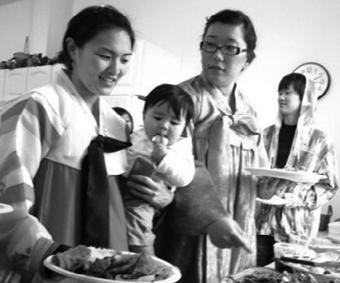 |
Chusok is not just a time for thanksgiving but also the time for reunion of families and loved ones. Chusok demonstrates the importance of family to Korean society. Family members, usually from the paternal line, get together to prepare food and honor their ancestors. As for my Korean family, preparations begin many days before the actual holiday. We begin preparations for Chusok weeks in advance by going to the market to buy the freshest fruits and vegetables. We go to Hadong to buy the newly harvested rice and other grains. We make a list of people and spend a considerable amount of time and money to prepare gifts for them. On the day before Chusok, my Korean mother and I busily prepare food to be put on the table for the ceremony.
On Chusok morning, we get up at dawn to carefully prepare the ancestral table for a memorial ceremony. Family members arrive early in the morning to participate in the ceremony. The male descendants gather in the big room and my brother-in-law presides over the ceremony. There are many rounds of bowing to the floor from a kneeling position, and ancestors are offered wine and food. Meanwhile, the women stay in the kitchen waiting for the ceremony to finish. After the ceremony all the food is taken out of the room and rearranged for the family to eat. We sit around the table to eat the wonderful food and reminisce about the ancestors. After the meal some of the food that has been set aside is taken by the men to the ancestral graves in Jinju while the women stay to clean up.
Chusok reminds us that Korea’s traditional gender roles and discrimination persist. On traditional holidays like Chusok or Seol-lal, it is believed that women should be primarily responsible for the cooking and preparing for the ceremonies and family gathering with the men only “needing” to help. Furthermore, since the family celebration is based upon paternal lineage, married women often are not able to celebrate with their original families. This aggravates gender discrimination, prompting some women to complain openly or to disregard the tradition of Chusok altogether.
Many things have been changed and women now actively participate in today’s Korean society and contribute significantly to the country’s economy. Despite Korea’s rapid industrialization, certain traditions are still observed and strong patriarchal values persist. There may have been significant changes in the status of women in Korea but on traditional holidays like Chusok, they are reminded of their traditional roles and are confined to the home. They are expected to fulfill their “duties” and be subservient. Fortunately, Chusok holiday this year lasts for three days only. Now that’s something to be thankful for.
cile Hwang media@changwon.ac.kr
<저작권자 © The Campus Journal, 무단 전재 및 재배포 금지>

 Shrinkflation, Consumer Deception
Shrinkflation, Consumer Deception




